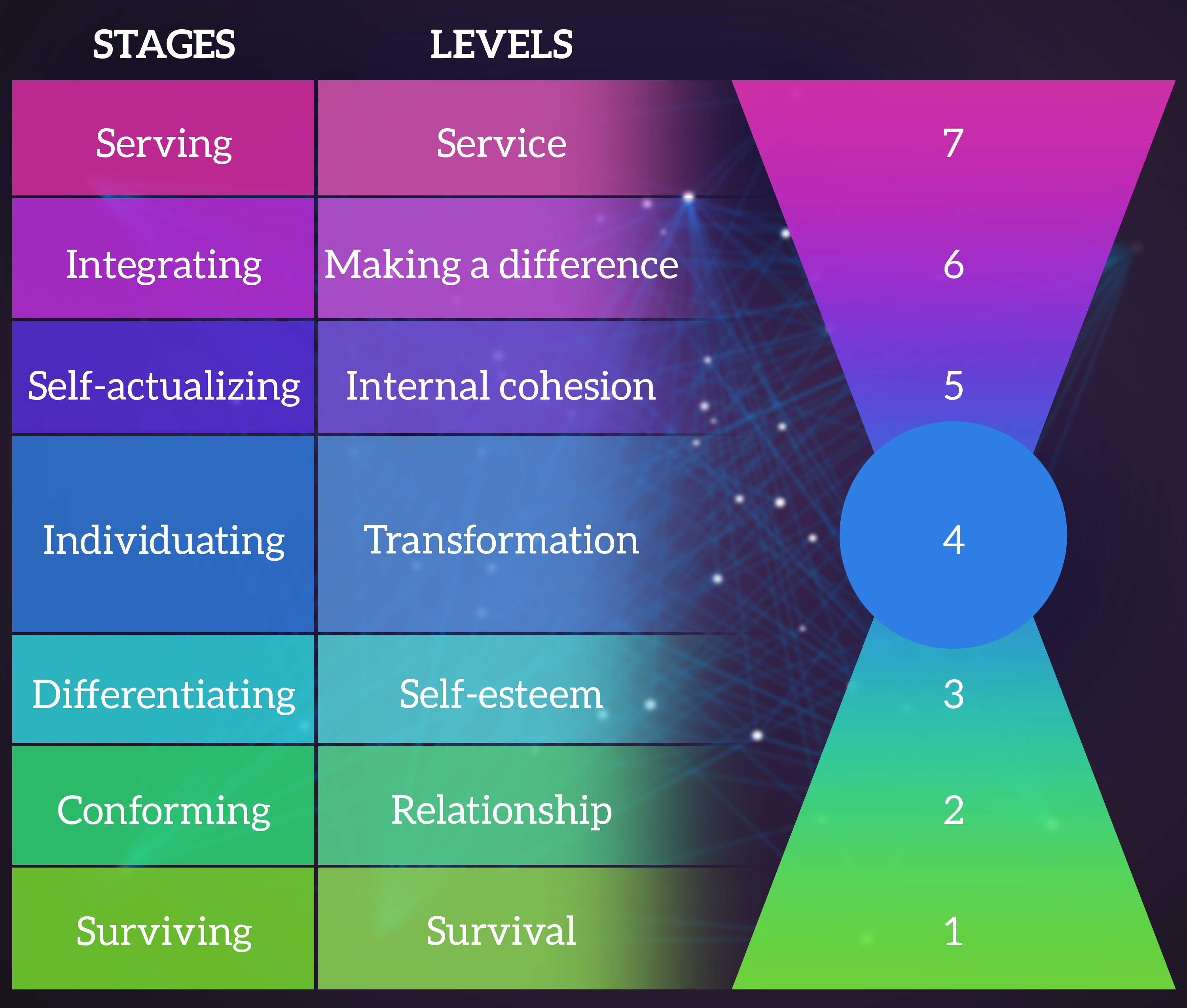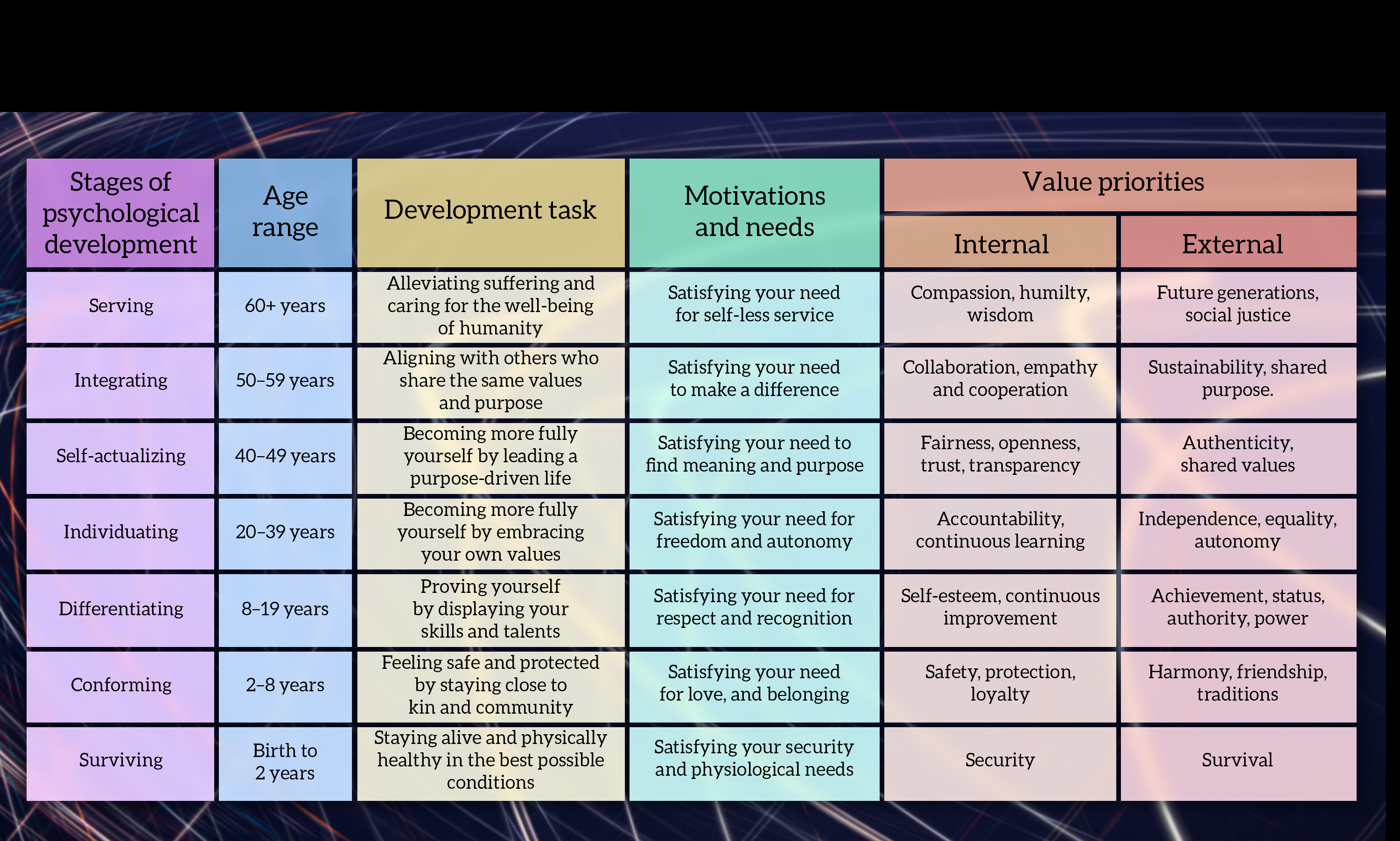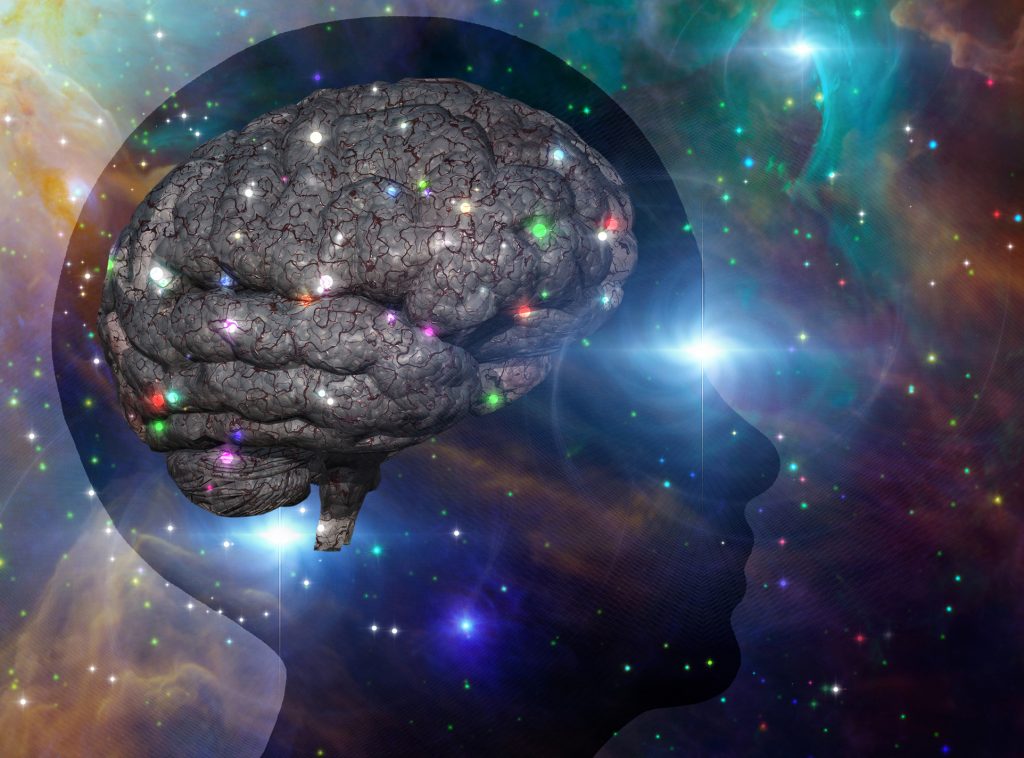Delivering the UN Global Goals | The Consciousness Perspective
The Seven Levels Model
The largest impediment to improving the well-being of humanity is not in finding the funding to implement the Sustainable Development Goals; the largest impediment is the unwillingness of the part of the heads of state, senior government politicians, and business leaders to embrace higher order human values. They have simply not reached the stages of psychological development were these values are important to them.
To understand this fully, we need to understand how people grow and develop; what needs they have at each stage of their development, and how best to provide these needs. The model I am using is called the Seven Levels Model. There are two aspects to the Seven Levels Model: the Stages of Psychological Development Model and the Levels of Consciousness Model. We grow in stages (of psychological development) and we operate at levels (of consciousness).
The original Levels of Consciousness model was developed in 1996 as a tool for mapping the consciousness of individuals and human group structures, such as teams, organisations, communities and nations. Since that time, the model and associated assessment tools have been used to map the values and consciousness of more than 5,000 organizations, 4,000 leaders and 24 nations.
The origins and construction of the model are explained in The Metrics of Human Consciousness and The Values-driven Organisation: Cultural Health and Employee Well-Being as a Pathway to Sustainable Performance. In recent years, I recognized that the Seven Levels Model could also be used as a framework for mapping the stages of human psychological development. Figure 1 shows the correspondence between the Seven Stages of Psychological Development and the Seven Levels of Consciousness.

Under normal circumstances, the level of consciousness you operate from will be the same as the stage of psychological development you have reached. However, no matter what stage of psychological development you are at, when you are faced with a threat—what you consider to be a potentially negative change in your circumstances or situation—anything that disturbs your equilibrium by bringing up fears, you may temporarily shift to one of the three lower levels of consciousness. Alternatively, if you have a “peak” experience—an experience of euphoria, harmony or connectedness of a mystical or spiritual nature—you may temporarily shift to one of the higher levels of consciousness. When the threat or peak experience has passed, you will return to the level of consciousness that corresponds to the stage of psychological development you were at before the experience occurred. In rare situations, a peak experience may have a lasting impact, causing you to shift to a higher stage of psychological development and operate from a higher level of consciousness. Similarly a “negative” experience, if it is traumatic enough, and particularly if it occurs in your childhood and teenage years, can impede your future psychological development by causing you to be anchored, through frequent subconscious triggering of the traumatic memory, into in one of the three lower levels of consciousness.
The early stages of development
Between the moment we are born and the time we reach physical maturity, around 20 years of age, we all pass through the same three stages of psychological development: surviving, conforming and differentiating. What you are learning during these stages of development is how to become a viable independent adult in your cultural framework of existence. These are the stages of development where you learn to satisfy your “deficiency” needs. When you are able to satisfy these needs, you feel a sense of happiness. If, for any reason, you are unable to satisfy these needs, you get anxious and fearful.
How well you master these first three stages of development will, to a large extent, depend on the degree and nature (positive and negative) of the parental programming and cultural conditioning you experienced during your infant, childhood and teenage years. If you grew up without too many negative experiences—without forming any significant fear-based beliefs about being able to meet your deficiency needs—you will naturally feel a pull towards the individuation stage of development when you reach your twenties or early thirties.
The individuating stage of development begins when you are ready to let go of the aspects of your parental programming and cultural conditioning that do not reflect who you truly are—values and beliefs that no longer resonate with. At this stage of development you are seeking to find your authentic voice, to live with integrity, and become responsible and accountable for every aspect of your life.
If you are fortunate enough to have had self-actualized parents, to have lived in a community or culture where freedom and independence is celebrated, where higher education is easily available, where men and women are treated equally, and where you are encouraged from a young age to express and think for yourself, the transition from the differentiating stage to the individuating stage of development will be relatively easy.
However, if the contrary is true, transitioning to the higher stages of development can be full of challenges and difficulties. It requires great courage when you are living in an authoritarian parental, cultural or political environment to embrace your authentic voice and explore your potential.
The later stages of development
Unlike the first three stages of psychological development, the later stages of development—self- actualizing, integrating, and serving, are not thrust on you by the biological and societal exigencies of growing up and reaching physical maturity as the first three stages of development are, they emerge as a desire to want more from your life, to find meaning in your existence, and make a lasting contribution to society. These are the stages of development where we learn to satisfy our “growth” needs. The extent to which you are able to satisfy your growth needs will determine the level of fulfillment you find in your life.
As a general rule, we spend the first half of our lives searching for happiness by finding ways to satisfy our deficiency needs, and if all goes well, we spend the second half of our lives searching for meaning by finding ways to satisfy our growth needs. If, due to circumstances or a particular situation you find yourself in, you are unable to meet your deficiency needs, satisfying these will take precedence over satisfying your growth needs.
Stages of psychological development
The seven stages of psychological development are shown in Table 1. The first column identifies the stages of development. The second column indicates the approximate age range when each stage of development becomes important. The third column describes the developmental task. The fourth column identifies the motivations and needs associated with each stage of development, and the fifth column lists the internal and external value priorities at each stage of development.
The age ranges given in the second column are approximate but are generally applicable to well educated people of all races, religions and cultures. Those who are less well-educated, poor and/or live in authoritarian regimes may find it challenging to move beyond the differentiating stage of development.
If you were brought up by self-actualized parents living in a liberal democracy, you may be able to accelerate your psychological development by a few years. Although this is relatively rare, it could become more prevalent as more parents self-actualize at an earlier age and more countries embrace the values found in liberal democracies.
In recent years it has become increasingly noticeable that some young people find their sense of purpose and feel the impulse to make a difference in the world quite early in their lives. This does not mean they have jumped to the integrating stage of development. Their urge to make a difference usually comes from their sense of justice or need for achievement, not from empathy. They will still need to pass through the individuating and self-actualizing stages of development before they are mature enough to fully embrace the integrating stage of psychological development.

Surviving
The quest for security and survival starts as soon as a human baby is born. The infant child instinctively knows, through its DNA programming, how to regulate its body’s internal functioning, how to suckle, and how to signal to its parents that it has unmet physiological needs. At this stage, the infant is completely dependent on parents or care givers to meet its security and survival needs.
Conforming
The task at this stage of development is to satisfy the child’s need for love and belonging. The child wants to live in an environment where it feels safe and protected. The young child quickly learns that life is more pleasant and less threatening if it lives in harmony with its parents and family. Staying loyal to kin and community, adhering to rules, and participating in rituals and traditions are important at this stage of development because they contribute to the child’s feeling of belonging and thereby enhance the child’s sense of safety.
Differentiating
During the differentiation stage of psychological development, the child/teenager seeks to satisfy his or her need for respect and recognition. We want to be noticed by parents, family, friends, peers, gang members or teachers for our achievements. The task at this stage of development is to hone your gifts and talents or make the most of your appearance so you feel accepted and recognized as a valid member of the group, family or community which you identify with. This may involve proving yourself through participating in rites of passage. You will be seeking validation from those around you that you are a valuable member of your community.
Your parents are instrumental at this stage of your development for giving you the positive feedback you need. If you fail to get this feedback, you will grow up with the subconscious belief that you are not good enough. You will feel driven to prove yourself. You will seek out groups where you feel accepted. You may become a seeker of perfection or a highly competitive employee, wanting status, power or authority so you can be acknowledged as someone important or someone to be feared. Feeling recognized and respected are our third most important human needs.
If you are able to successfully transition through these first three stages of psychological development without experiencing significant trauma and without developing too many subconscious fears about your ability to meet your deficiency needs, then you will find it relatively easy to establish yourself as a viable adult in the cultural framework of your existence as long as you can find opportunities to earn a living that meets your survival needs.
Individuating
During the individuating stage of psychological development, which usually begins after the age of twenty, you will begin to feel the need for freedom and autonomy. The task at this stage of development is to transcend the physical and emotional dependence on your family and the cultural or religious groups you are embedded in by aligning with your own deeply held values—discovering who you really are and what you stand for at the deepest level of your being. You begin to establish your independence when you set up your own home and embrace the values and beliefs you resonate with, rather than the values and beliefs that were subconsciously programmed into you by your parents and the community and culture you grew up in.
This is one of the most important and difficult stages of human development—the shift from dependence to independence. When you reach this stage of development you begin to seek answers to the question, Who am I?
Understanding who you are is absolutely essential for finding fulfillment. The progress you make at this stage of development will to a large extent influence how smoothly you are able to move through
the higher stages of psychological development. We only embark on the individuating stage of development after we have become reasonably proficient in meeting our deficiency needs.
Self-Actualizing
During the self-actualization stage of development, you begin the search for meaning and purpose—you want to fully express your unique gifts and talents. You want to know: Why am I here? What do I need to do to find fulfillment in my life? What is my true vocation? What is my calling?
For most people, finding their vocation or calling usually begins with a feeling of unease or boredom with their job or chosen career; with the work they thought would bring them wealth, status or recognition in their lives. Uncovering your unique gifts and talents and making them available to the world will bring passion and vitality back into your life. You will become more intuitive and more creative. You will spend more time in a state of flow; being totally present to what you are doing, lost in your work.
This can be a challenging transition, especially if the activities that now interest you are less remunerative and offer less secure employment than your job, profession or chosen career. You may feel scared or uncomfortable embarking on something new which may bring meaning to your life but may not pay the rent or put food on the table.
Some people find the work they are born to do early in their lives; others discover it much later. Some spend their whole lives searching. Embracing your authentic self by living your values and finding meaning and purpose in your life is the next most important need to emerge after you have found freedom and independence.
Integrating
During the integrating stage of development, you will begin to feel the need to actualize your sense of purpose by using your unique gifts and talents to make a difference in the world. As you make progress, you will realize that the contribution you can make and the impact you can have in the world could be significantly enhanced by connecting and cooperating with others who share your values and purpose—people you resonate with. By collaborating with others you are able to make a bigger difference than you could on your own.
This requires a high level of maturity. You must be able to recognize your limitations, assume a larger sense of identity and shift from being independent to being interdependent. Many people lack the flexibility or adaptability to make this shift. Others get lost in their own creativity.
In order to cooperate with others on joint projects, you must learn how to master your emotions (emotional intelligence) and read the emotions of others (social intelligence). Collaborating with others to make a difference in the world is the next most important need to emerge after you have learned to embrace your authentic self.
Serving
During the serving stage of development you will feel drawn to a life of self-less service, especially if you have become financially independent or no longer depend on the income from you work for your survival. At this stage of development, you want to leave a legacy or give back to the world by alleviating suffering, caring for the disadvantaged or building a better society.
The shift to a life of self-less service will affect every aspect of your life; your attitudes, your behaviours, and your values. You will uncover new levels of compassion as you become focused on the needs of others. You will feel more humility as you recognize the added value that others bring to your endeavors and the role that synchronicity plays in your life. You will also find yourself re- examining your priorities as you search to live a more balanced life.
Deep down, you will begin to understand that we are all connected energetically, and that by serving others you are serving yourself. Selfless service for the benefit of humanity and future generations is next most important need to emerge after you have learned how to collaborate with others to make a difference in your world. You will find your deepest level of fulfilment at this stage of psychological development.
Progression
The seven stages of psychological development occur in consecutive order over the full period of our lives. If, for whatever reason, you fail to master the skills required to meet the needs of a particular stage of development, you will find yourself having to return to that stage of development until you have become proficient at satisfying those needs.
We begin the journey of psychological development by learning to survive, and we complete the journey by learning to serve.
Implications for UN Sustainable Development Goals
If, as a global society, we really do want to build a sustainable future for humanity, there needs to be a seismic shift in the psychological development of our political leaders: A shift from a focus on “I” to “we”; and a shift in attitude from what’s in it for me, to what’s best for the common good. It is very clear we will not solve the issues we face as a global society until we experience an evolution of human consciousness.

What our world leaders are failing to understand is that there is an evolutionary advantage in being able to expand your consciousness (your sense of identity) to include others—in other words, there is an evolutionary advantage in advancing your psychological development. This idea is backed up by the latest scientific research. Using game theory, two evolutionary biologists found that:
Evolution will punish you if you’re selfish and mean. For a short time and against a specific set of opponents, some selfish organisms may come out ahead. But selfishness isn’t evolutionary sustainable.
The world-renowned biologist E. O. Wilson expresses a similar thought:
Selfish activity within the group provides competitive advantage but is commonly destructive to the group as a whole. … When an individual is cooperative and altruistic, this reduces his advantage in competition … but increases the survival and reproduction rate of the group as a whole.
Wilson goes on to state:
The origin of the human condition is best explained by the natural selection for social interaction—the inherited propensities to communicate, recognize, evaluate, bond, cooperate and from all these the deep warm pleasure of belonging to your own special group.
The tragedy of cultural evolution, which became the successor of species evolution with the arrival of Homo sapiens, is that we have not yet learned to restrain our self-interest at the group level. Our group structures (nation states) are still trying to compete instead of cooperating.
We have made the mistake of believing that the benefits of intra-group competition, such as improving the group’s fitness and performance, also apply to inter-group competition. Nothing could be further from the truth: From an evolutionary perspective inter-group cooperation is far more successful than inter-group competition.
Furthermore, intra-group competition only works to a group’s collective advantage if the competition takes place within an over-arching, rule-based, cooperative environment. For example, teams which are members of a football league cooperate with each other at the level of the organisation of the league, but compete with each other according to rules which are administered by referees from the football league organisation. The same is true of the Olympic Games: Athletes from nations compete with each other within a framework of rules managed by the International Olympic Committee, members of which come from every nation. We also see this form of regulated competition between countries in the European Union and between states in the United States. For intra-group competition to work successfully, it must always take place within a framework of cooperation and shared values.
These findings have significant implications for the future of our species. For cultural evolution to continue we must not only learn how to bond with each other as individuals to form group structures (nations), our group structures (nations) also have to learn how to cooperate with other group structures (nations) that have a different “tribal” identity. Without a set of overarching rules to regulate competition, we will not be able to solve the problems of humanity: the problems of humanity are global, but the entities that must solve these problems are national.
The only way we are going to learn how to cooperate is by transcending our “tribal and religious” identities. E. O. Wilson calls tribalism “the exquisitely human flaw.”
People deeply need membership in a group, whether religious or secular. They know that happiness and indeed survival itself require that they bond with others who share some amount of genetic kinship, language, moral beliefs, geographical location, dress code, etc. … It is tribalism … that makes good people do bad things.
Millions upon millions of people all over the planet have died in conflict because of this basic human dysfunction, the source of which is our instinctive need to belong for the purpose of survival. We have to learn to transcend our ethnic and religious origins if we want to survive as a species.
Wilson states:
In a nutshell, individual selection [self-interest] favors what we call sin, and group selection [common good] favors virtue. The result is the internal conflict of conscience…We need to understand ourselves in both evolutionary and psychological terms in order to plan a more rational, catastrophe-proof future.
Thus, as far as human beings are concerned, the solution to Wilson’s internal conflict of conscience is found in the individuation and self-actualization stages of psychological development. Only when our world leaders reach these stages of psychological development and create the conditions where their citizens can reach these stages of psychological development will we be able to make significant progress in improving the well- being of humanity.







Yes! As Mary said it.